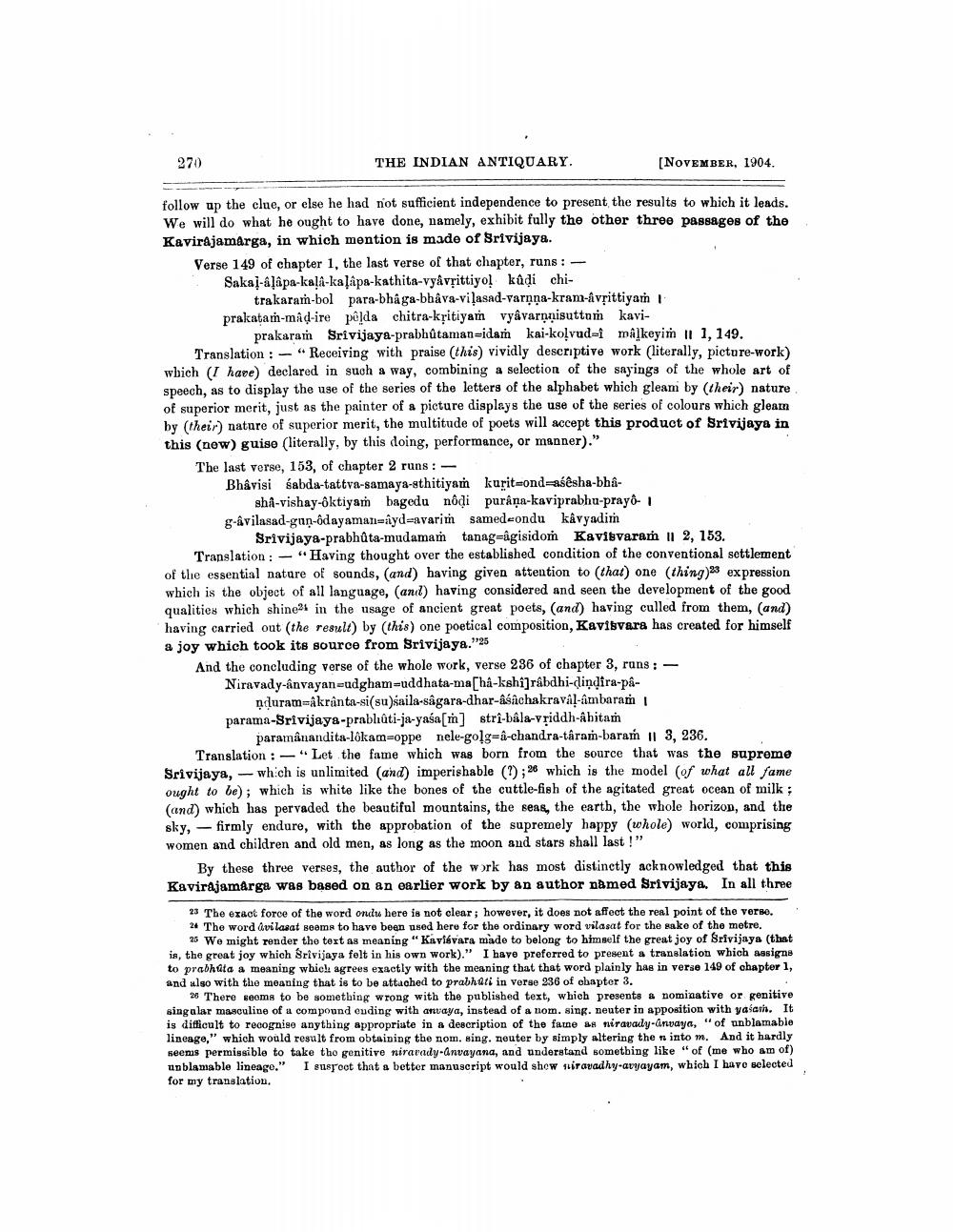________________
270
THE INDIAN ANTIQUARY.
(NOVEMBER, 1904.
follow up the clue, or else he had not sufficient independence to present the results to which it leads. We will do what he ought to have done, namely, exhibit fully the other three passages of the Kavirajamarga, in which mention is made of Srivijaya. Verse 149 of chapter 1, the last verse of that chapter, runs : Sakal-alapa-kaļa-kalapa-kathita-vyavrittiyo! kadi chi
trakararn-bol para-bhaga-bhava-viļasad-varņņa-kram-Avrittiyar prakatam-mad-ire pêļda chitra-kpitiyam vyâvarnnisuttum kavi
prakaram Srivijaya-prabhùtaman-idam kai-ko!vud- mA keyin 11 1,149. Translation : - Receiving with praise (this) vividly descriptive work (literally, picture-work) which I have declared in such a way, combining a selection of the sayings of the whole art of speech, as to display the use of the series of the letters of the alphabet which gleam by (their) nature of superior merit, just as the painter of a picture displays the use of the series of colours which glearn by (their) nature of superior merit, the multitude of poets will accept this product of Srivijaya in this (now) guise (literally, by this doing, performance, or manner)." The last verse, 153, of chapter 2 runs: - Bhavisi sabda-tattva-samaya-sthitiyam kuriteond-aśêsha-bha
shi-vishay-oktiyar bagedu nôdi purana-kaviprabhu-pray-1 g-Avilasad-gun-odayamanwyd avarit samedeondu kávyadim
Srivijaya-prabhàta-mudamam tanag=îgisidom Kavibvaram 112, 153. Translation : - "Having thought over the established condition of the conventional settlement of the essential nature of sounds, (and) having given attention to that one thing as expression which is the object of all language, (and) having considered and seen the development of the good qualities which shine in the usage of ancient great poets, (and) having culled from them, (and) having carried out the result) by (this) one poetical composition, Kavisvara has created for himself a joy which took its source from Srivijaya."25 And the concluding verse of the whole work, verse 236 of chapter 3, runs: - Niravady-Anvayan=udgham-uddhata-ma[hâ-kshi]rabdhi-dindira-på
nduram ikrinta-si(su)saila-sågara-dhar-aśâchakraval-Ambaram parama-Srivijaya-prablûti-ja-yasa[m] strî-bala-vriddh-abitam
paramânandita-lokam-oppe nele-golg=a-chandra-tárai-baran 11 3, 236. Translation : - Let the fame which was born from the source that was the supreme Srivijaya, - which is unlimited (and) imperishable (1) ; 26 which is the model of what all fame ought to be); which is white like the bones of the cuttle-fish of the agitated great ocean of milk; (and) which has pervaded the beautiful mountains, the seas, the earth, the whole horizon, and the sky, - firmly endure, with the approbation of the supremely happy whole world, comprising women and children and old men, as long as the moon and stars shall last !"
By these three verses, the author of the work has most distinctly acknowledged that this Kavirajamarga was based on an earlier work by an author named Srivijaya. In all three
23 The exact force of the word ondu here is not clear; however, it does not affect the real point of the verse. 24 The word dui lasat seams to have been used here for the ordinary word vilasat for the sake of ti
25 We might render the text as meaning "Kavisvara made to belong to himself the great joy of Srivijaya (that is, the great joy which Srivijaya felt in his own work)." I have preferred to present a translation which assigne to prabhdta a meaning which agrees exactly with the meaning that that word plainly has in verse 149 of chapter 1, and also with the meaning that is to be attached to prabhati in verse 236 of ebaptor 3.
26 There seems to be something wrong with the published text, which presents a nominative or genitive singalar masculine of a compound euding with anvaya, instead of a nom. sing. neuter in apposition with yasath. It is difficult to rooonise anything appropriate in a description of the fame an miravady-Anaya." of unblamable lineage," which would result from obtaining the nom. sing. Deuter by simply altering the into m. And it hardly seems permissible to take tho genitive niravady-Anvayana, and understand something like " of (me who am of) unblamable lineage." I suspoot that a better manuscript would show tuiravadhy-avyayam, which I have selected for my translation.




